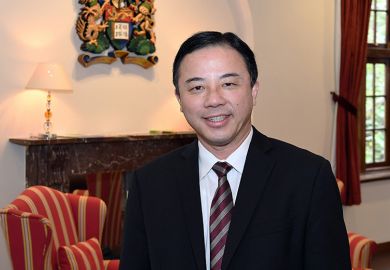Source: Getty
One of us?: call to end ‘apartheid’
Lecturers can be guilty of “snobbery” towards vice-chancellors who do not have an academic background, according to the deputy registrar of the University of Oxford.
Michael Sibly said he did not think higher education leaders had to be eminent researchers, or even to have worked in universities previously – but he conceded that his institution, which is advertising for a new vice-chancellor, was probably not ready to break with tradition.
Speaking in Oxford on 4 November at the development conference of the Association of University Administrators, Mr Sibly said lecturers’ “closed” culture put vice-chancellors who did not have an academic background at a disadvantage.
“In most universities, and certainly ones like this, you’re hobbled from the very beginning because of the academic snobbery,” Mr Sibly said. “Academics will think ‘if this person has only ever run the health service, clearly they can’t run a university’.”
Mr Sibly said some people felt that the next vice-chancellor of Oxford had to be a fellow of an association such as the Royal Society, but he disagreed. “It helps if you have a strong academic background, but you don’t need to be an academic. What you need to do is understand universities and understand the people who work in them,” he argued.
Asked about the person who will take over from Andrew Hamilton when his seven-year term ends in 2016, Mr Sibly said he was “not sure if the institution is ready” for a non-academic leader, but he noted that a number of masters of Oxford colleges had been appointed from outside higher education.
Although, beyond Oxbridge, some vice-chancellors have backgrounds in industry, few have been selected following careers as university administrators.
Asked about the treatment of non-academic employees after delivering the AUA’s annual lecture on the same day, Janet Beer, vice-chancellor of Oxford Brookes University, said notions of “apartheid that prevail in our institutions about types of staff” had to end.
She said it was “tough” for non-academic staff to progress into very senior jobs, but that administrators “would and do excel” in such posts. “We need to be more open-minded in the sector about where we draw talent from,” she added.
Professor Beer’s lecture focused on diversity in higher education, and she reiterated her call to introduce quotas for the proportion of women and ethnic minority candidates being appointed to leadership roles. She also said that universities should aim to ensure that their governing bodies are at least 40 per cent female.
Earlier, the conference heard calls for greater protection for students whose courses are cancelled, with the option of a refund or a transfer to another course.
Jim Dickinson, chief executive of the students’ union at the University of East Anglia, said current protection was “worse than if you book a package holiday to Benidorm”.
He also argued that students should have the right to appeal against the marks they are given, warning that current methods of marking and assurance were not designed for an era of mass higher education.
Mr Dickinson said academic judgement could not be unchallengeable when students were spending so much money on their courses.
Register to continue
Why register?
- Registration is free and only takes a moment
- Once registered, you can read 3 articles a month
- Sign up for our newsletter
Subscribe
Or subscribe for unlimited access to:
- Unlimited access to news, views, insights & reviews
- Digital editions
- Digital access to THE’s university and college rankings analysis
Already registered or a current subscriber? Login





